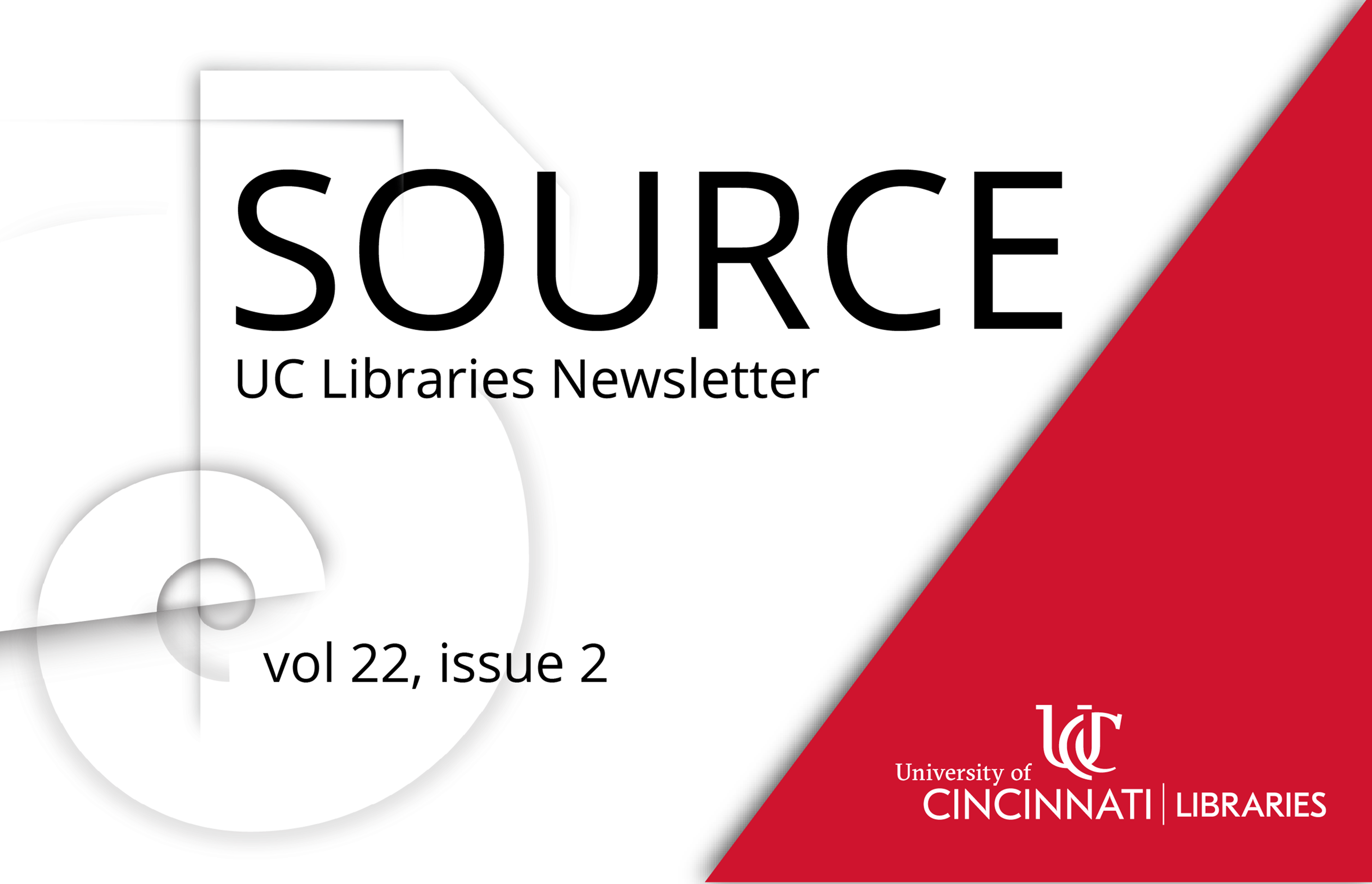Most University of Cincinnati Libraries locations have reduced hours for Spring Break, March 9-16. Check the library website for a list of hours by location.
Have a safe and rejuvenating Spring Break, Bearcats!


Most University of Cincinnati Libraries locations have reduced hours for Spring Break, March 9-16. Check the library website for a list of hours by location.
Have a safe and rejuvenating Spring Break, Bearcats!

On February 19, 2024 Devhra BennettJones joined the University of Cincinnati Libraries as the archivist and curator of the Henry R. Winkler Center for the History of the Health Professions.
Devhra is a certified archivist and holds a Master of Science in Organizational & Human Resources Development from Abilene Christian University and a Master of Arts in History from our own University of Cincinnati. Previously, Devhra worked in the Cincinnati area at both the Lloyd Library & Museum and the American Jewish Archives. Devhra is actively engaged with the Society of American Archivists and the Society of Ohio Archivists and brings a wealth of knowledge to UC Libraries.
“The main thing that I am looking forward to in the new position is the opportunity to contribute to the preservation of medical history and to provide access to the rich historical collections held by the Winkler Center,” said Devhra. “It is an honor to work here!”

The Henry R. Winkler Center for the History of the Health Professions is an archive and exhibit facility chronicling the history of the health sciences primarily in the Cincinnati area. The Winkler Center’s over 35,000 volumes of rare and classic works on health history however broaden that scope to include Europe and date back almost 500 years. In addition to its archival collections, books, and medical objects, the Winkler Center also presents public and educational programming, and workshops throughout the year.
In November 2023, faculty and student artists from UC’s College of Design, Architecture, Art and Planning (DAAP) joined the poets of Poetry Stacked to create three paintings spontaneously while immersed in the reading’s live audience.
To complete the creative loop of that dynamic collaboration, the Elliston Poetry Room and the University of Cincinnati Libraries are hosting Talkback Ekphrastic, a two-part discussion and workshop about art, poetry, inspiration and process on Thursday, March 21 at 6:30pm in the Elliston Poetry Room, 646 Walter C. Langsam Library.
The event kicks off with the official, public debut of the Poetry Stacked paintings. Kyle Angel, adjunct instructor in DAAP, will provide opening remarks about the collaboration, followed by a talkback/Q&A with Kyle and the other artists.
After that, the discussion will transition from the painted ekphrastic to the written, where Alecia Beymer, poet and assistant professor/educator in UC’s Department of English, will share an introduction to ekphrastic poetry (poems written about works of art). Alecia will then facilitate an ekphrastic writing exercise with the gathered audience, asking participants to draft poems inspired by the three art pieces created at Poetry Stacked.
The event concludes with a short open mic for anyone to share their work and where the artists (who are also writers!) might share some of their poetic work.
Refreshments will be provided. The event is expected to last 75 minutes and is free and open to all to attend, including students, staff faculty and the community. More information about Poetry Stacked is available on the Libraries website.
Know of a good book to eat?! Create an Edible Book for UC Libraries International Edible Books Festival!
It’s time once again for the fan-favorite International Edible Books Festival scheduled for Monday, April 1, 2024, 11 a.m. on the 4th floor of the Walter C. Langsam Library. UC Libraries is seeking people interested in creating an edible book for the enjoyment of all in attendance. There are few restrictions – namely that your creation be edible and have something to do with a book – so you may let your creativity run wild.
As in previous years, entries will be judged according to such categories as “Most Delicious,” “Most Creative,” “Most Checked Out” and “Most Literary.” Those awarded “Best Student Entry” and “Best Overall” will win UC merch.
If you are interested in creating an edible book, e-mail libraries@uc.edu by Monday, March 25 with your name and the title of your creation.
Looking for inspiration? View the Facebook album to see photos from the previous festivals.


Read Source, the online newsletter, to learn about the news, events, people and happenings in UC Libraries.
In this issue of Source, Liz Kiscaden, dean and university librarian, writes about moving forging a path as we create our strategic plan. Readers can access the Strategic Plan to give a sense of what we accomplished in 2022/2023. Collections play a prominent theme in this issue, including in a new DAAP Library exhibit, Rediscovering Catherina van Hemmessen’s Flagellation of Christ: Women as Artists, Patrons and Rulers in Renaissance Europe, that features prints, books and manuscripts from the collections of UC Libraries and in the acquisitions of Blue Books in the Archives and Rare Books Library. Collaboration is another theme of this issue when we write about Poetry Stacked Beyond the Bookshelves and the efforts of several librarians and staff to present for school children participating in the College Mentors for Kids program. And don’t miss the article about the lost mural in the CEAS Library.
Read these articles, as well as past issues, on the website. To receive Source via e-mail, contact melissa.norris@uc.edu to be added to the mailing list
Thank you for your valuable input in our most recent survey question regarding the shared space between the Frederick A. Marcotte Library and the Clermont College Learning Commons! Your answers and opinions are helping us turn the library’s second floor into a remarkable place for studying and learning.
Our newest survey question regarding our spatial collaboration is now live. Until March 25th, we’re asking: What would make you more inclined to use library and/or Learning Commons services?
Please respond to this question anonymously through this online form or one of the two response collection boxes located outside of the Library’s main entrance and in the McDonough lobby.
Classicists and supporters gathered en masse on Tuesday, February 20, to celebrate the work of Peter van Minnen, John Miller Burnam Professor of Classics and world-renowned papyrologist.
Continue readingPi Day is happening over spring break, but that won’t keep the Frederick A. Marcotte Library from celebrating early!
RSVP for our Pre-Pi Day Potluck on the event’s GetInvolvedUC event page today and join us in the library at noon on Thursday, March 7th for the festivities. You bring a pie to share and we’ll supply the plates and cutlery. We’ll see you there!
The University of Cincinnati Libraries and the Elliston Poetry Room announce the next roster of poets for Poetry Stacked, a semi-regular poetry reading series held in the 6th floor east stacks of the Walter C. Langsam Library.
At the next event, scheduled for Wednesday, March 6 at 4:30pm, three poets will read their original work:
